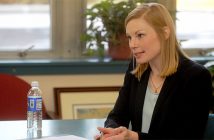
Utah’s House Education Committee on has decided to continue with abstinence-based sex education classes by voting against a bill supporting a change to comprehensive courses.
Another bill that would replace the current policy of excusing students from courses on sexual-abuse prevention with requiring that parents consent before their children attend the classes was not voted on before adjournment of the committee.
The Salt Lake Tribune’s Benjamin Wood writes that both measures were focused on what classroom-content students should receive and what role parents will take on these issues.
“The reality is the vast majority of parents are their children’s greatest protectors,” said Laura Bunker, Utah chapter director of United Families International. “We need to maximize that tremendous resource.”
Rep. Kevin Stratton (R-Orem) sponsored HB335, and Bunker was in support of overturning the law from opt-out to opt-in for sexual abuse prevention classes.
The sexual abuse prevention courses were to begin in the fall after two years of production. Supporters of the classes say insisting on parental consent would create a situation where abusers in the family could keep the abused from learning appropriate and inappropriate behaviors and reactions.
According to Salt Lake County District Attorney Sim Gill, approximately half of the county’s child abuse cases are committed in the victim’s home, and one-third of the cases are perpetrated by parents. He added that he could not endorse Stratton’s measure because it would make it difficult for unprotected Utahns to report abusive practices.
“We should not allow offenders to so easily control their victim’s access to information about what is appropriate physical contact and what is a crime,” he said.
At this point, the chair of the committee may place the bill on a future schedule.
But Rep. Brian King (D-Salt Lake City) had proposed a bill that would have begun a more vigorous curriculum on human sexuality and would have given parents the right to opt-in their children.
Tuesday’s meeting, however, put an end to the comprehensive sex ed program supported by King. Currently, state law allows for the least possible instruction on contraceptives and sexually transmitted infections and encourages abstinence from sexual activity before marriage.
King noted that rates of sexually transmitted diseases in Utah had risen over the past decade among young people between the ages of 15 and 29. He admitted that abortion rates have declined, but added that the young men and women need guidance on methods of preventing unwanted pregnancies.
The bill, HB246, defines in detail what comprehensive human sexuality education includes:
“human reproduction, reproductive anatomy, and reproductive physiology; all methods to prevent unintended pregnancy and sexually transmitted diseases and infections, including HIV and AIDS,” among other health risks.
The results of a UtahPolicy poll released last week, which questioned 625 adult Utah residents, found that 64% of the participants were for comprehensive sex education. Just 25% of the respondents supported abstinence-only sex education, and 11% were unsure or favored another type of course, reports Morgan Jacobsen of Deseret News.
King said other states that allow the teaching of other options than abstinence have decreased rates of STDs, abortions, and unintended pregnancies.
Utah Addiction Centers CEO Jeremy Broberg said that it was unfortunate, but many young people are introduced to sex before they should be, which can lead to behaviors that are inappropriate and have a chance of intensifying. He felt that giving students broader information on sexuality could increase sexual activities, reports Glen Beeby of KTVX-TV.
Robert Boyd of KSTU-TV says the lawmakers had a brief discussion after which most of the committee said they were of the opinion that sex education should not be taught in the classroom, but in the home. King replied that parents do not know the difference between gonorrhea and chlamydia or other sexually transmitted diseases. He prefers to have qualified instructors teaching kids in Utah and plans to bring the bill back next year.




